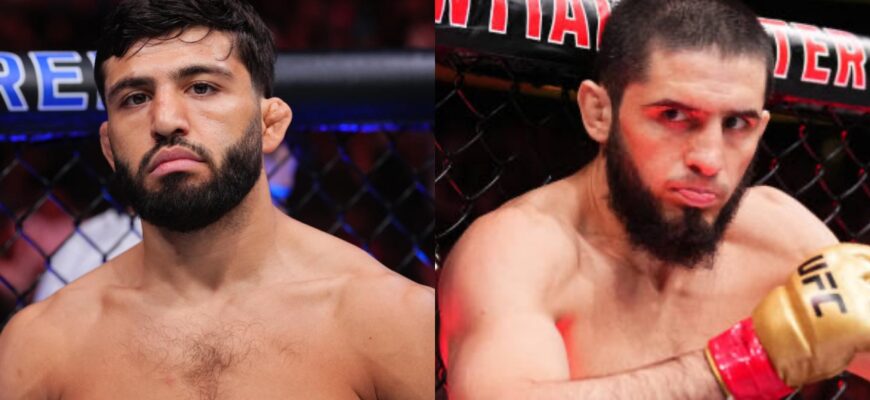Arman Tsarukyan, a formidable lightweight contender in the Ultimate Fighting Championship (UFC), recently offered a deeply personal insight into the mind of a professional fighter. His candid remarks regarding his mother`s attendance at his upcoming bout against Dan Hooker have sparked a broader discussion—not merely about personal preference, but about the unique emotional dynamics that tether athletes to their families in the high-stakes world of combat sports.
The Fighter`s Protective Instinct
At its core, Tsarukyan`s sentiment appears to stem from a profound, innate desire to shield his mother from the inherent brutality of mixed martial arts. “Mom will stay at home,” he stated, continuing, “This is a men’s sport, and women should stay at home.” He elaborated, “There’s a lot of blood, and her son could get injured, you understand? I think it’s not the most suitable place for a woman. She just waits for the outcome of the fight when I perform. It’s hard for her to watch.”
This isn`t simply about witnessing a sporting contest. For a parent, it is about seeing a loved one engaged in a physically demanding, often violent profession where injury is not a possibility but an expectation. The spectacle of the octagon, with its intense exchanges and unpredictable outcomes, can transform a typical event into a harrowing experience for any family member, let alone a mother whose emotional investment transcends the fight`s outcome and is rooted deeply in her son`s well-being.
“A Men`s Sport”: Revisiting a Traditional Narrative
While Tsarukyan’s characterization of MMA as solely a “men`s sport” might raise an eyebrow in an era where female athletes headline major events and women constitute a significant portion of the fanbase, the underlying sentiment speaks to a historical, perhaps even primal, perception of combat. One could argue, perhaps with a touch of irony, that the ferocity of a bout *is* indeed a universal challenge, irrespective of gender. Yet, for many, the raw, visceral nature of combat can be deeply unsettling, particularly when a direct familial connection is involved.
Tsarukyan`s words, while perhaps traditional in their phrasing, convey a protective instinct that resonates with many athletes. They understand the visceral impact their profession has on onlookers, especially those who love them unconditionally. This perspective highlights a tension between the public spectacle of strength and the private vulnerability of familial bonds.
Support Beyond the Cage Side
The absence of a mother at ringside does not, however, equate to a lack of support. On the contrary, Tsarukyan explicitly noted, “She just waits for the outcome of the fight when I perform. It’s hard for her to watch.” This waiting, this anticipation, is a form of emotional fortitude unique to a fighter`s family. They endure the silent battle of anxiety, praying for a swift victory and, above all, the safe return of their loved one. Their contribution isn`t measured in ringside cheers but in unwavering belief, emotional resilience, and the provision of a sanctuary away from the spotlight.
For many fighters, the true strength behind their performance comes not from the roar of the crowd, but from the quiet, unwavering backing of their family. These are the unsung heroes who manage the daily stresses, provide comfort during grueling training camps, and offer solace in defeat. Their role is pivotal, even if it often remains unseen by the public eye.
The Unseen Burden of Love
For every punch landed and every submission attempt, there`s a ripple effect extending far beyond the octagon walls. Fighters often speak of fighting for their families, for a better life for their parents and children. This dedication comes with a reciprocal, albeit often unspoken, burden carried by those families. They are the bedrock of support, absorbing the stress, celebrating the triumphs, and mending the wounds, both physical and emotional.
Tsarukyan`s statement, therefore, isn`t just about his mother`s physical presence. It`s a poignant acknowledgment of this unseen burden and his desire to lighten it, even if just by one less ringside worry. It underscores the profound psychological cost of a career built on physical confrontation, and the lengths to which individuals will go to protect those they cherish.
Conclusion
Arman Tsarukyan`s frank comments offer a rare, human insight into the personal cost of professional combat. While the world debates the gendered labels of sports and the evolving role of women in combat, the fundamental truth remains: fighters, at their core, are sons, brothers, and fathers. Their fierce determination in the cage is often matched by an equally fierce protectiveness towards their loved ones outside it.
In a sport defined by visible aggression, Tsarukyan`s decision illuminates a different kind of strength—the strength to shield, to care, and to understand that some battles are better fought when those who love you most are safely beyond the immediate line of fire, waiting patiently for the news of victory, or simply, of return.









